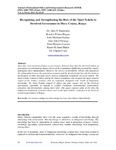| dc.description.abstract | After fifty years of mixed fortunes in governance, Kenyans hope that the devolved system of
governance as enshrined in chapter eleven of the Constitution fulfills the potential the country
anticipated since independence. However, the success of devolution will not only depend on
the relationship between the national government and the devolved units but will also bank on
involvement of other non-state actors such as indigenous institutions of social control. The
Njuri Ncheke council of elders among the Ameru community, who occupies the upper Eastern
region of the country, presents such an institution. Equipped with wealth of indigenous
knowledge, the Njuri Ncheke council of elders can play crucial role in the devolved
government, especially in regards to conflict resolution, environmental conservation,
education and development, among other roles. This paper explores some of the roles the
indigenous institutions of social control, such as the Njuri Ncheke, could play in the devolved
system of governance in Kenya. | en_US |

